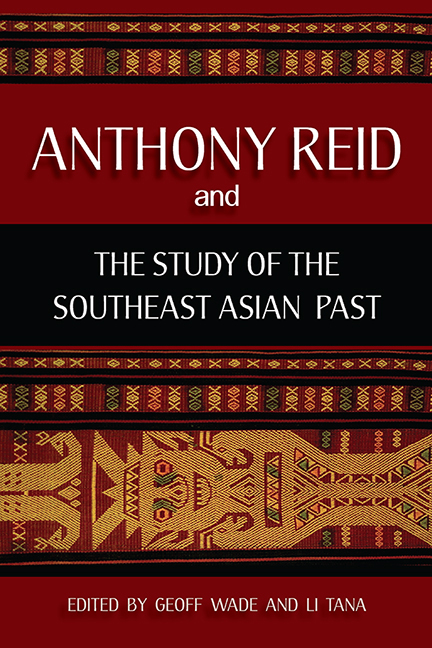Book contents
- Frontmatter
- Contents
- Acknowledgements
- The Contributors
- PART I Introduction
- PART II The Scholarship of Anthony Reid
- PART III Southeast Asia in the World
- PART IV Early Modern Southeast Asia
- 7 Southeast Asian Islam and Southern China in the Fourteenth Century
- 8 Lancaran, Ghurab and Ghali: Mediterranean Impact on War Vessels in Early Modern Southeast Asia
- 9 Weather, History and Empire: The Typhoon Factor and the Manila Galleon Trade, 1565–1815
- 10 Interracial Marriages and the Overseas Family: The Case of the Portuguese Topasses in Timor
- 11 A Note on the Čhām Diaspora in the Ayutthayan Kingdom
- 12 Tongking in the Age of Commerce
- PART V Modern Southeast Asia
- Appendix
- Index
- Plate section
10 - Interracial Marriages and the Overseas Family: The Case of the Portuguese Topasses in Timor
from PART IV - Early Modern Southeast Asia
Published online by Cambridge University Press: 21 October 2015
- Frontmatter
- Contents
- Acknowledgements
- The Contributors
- PART I Introduction
- PART II The Scholarship of Anthony Reid
- PART III Southeast Asia in the World
- PART IV Early Modern Southeast Asia
- 7 Southeast Asian Islam and Southern China in the Fourteenth Century
- 8 Lancaran, Ghurab and Ghali: Mediterranean Impact on War Vessels in Early Modern Southeast Asia
- 9 Weather, History and Empire: The Typhoon Factor and the Manila Galleon Trade, 1565–1815
- 10 Interracial Marriages and the Overseas Family: The Case of the Portuguese Topasses in Timor
- 11 A Note on the Čhām Diaspora in the Ayutthayan Kingdom
- 12 Tongking in the Age of Commerce
- PART V Modern Southeast Asia
- Appendix
- Index
- Plate section
Summary
In historiographical terms, the publication of the first volume of Southeast Asia in the Age of Commerce in 1988 marked a watershed in the study of the region's premodern history. In this pioneering work Anthony Reid touched on many aspects of daily life, but he remains one of the few historians to think seriously about the ways in which social and economic changes of the period affected understandings of what constituted a family. In particular, Tony drew attention to the growing visibility of sexual relations between foreign traders and local women, remarking that “interracial unions were a feature of all the commercial cities of Southeast Asia”. Such unions had long been customary, but the presence of individuals born of “mixed” parentage became more noticeable in early modern times because so many European men arrived in Asia without women. As terminologies were expanded to include new words such as mestiço and half-caste, European desire for demographic classification of the areas that came under their control raised questions about the place of such individuals in the social system. These very classifications, and the invidious prejudice that privileged a white skin, meant that even influential families of mixed ancestry found it difficult to placetheir sons in positions of authority in European-dominated administrations, despite the obvious need for linguistically qualified people as cultural bridges. Acceptance by European society was always qualified, always contingent upon individual abilities, and it could never be assumed that a mestiço son would inherit any status or advantage acquired by his father. In this context, the territorial control and political power wielded by certain mestiço families in Timor, and the standing they attained in the local environment, represents an intriguing exception.
Maintaining the home culture in the overseas family
Although miscegenation was increasingly common from the sixteenth century, the earliest records suggest that traders arriving in Southeast Asia had long been aware of the advantages that followed their acceptance by a local woman and her family as a legitimate sexual partner. Even a brief liaison could create a whole network of adoptive kin and thus become a significant means of strengthening economic relationships.
- Type
- Chapter
- Information
- Anthony Reid and the Study of the Southeast Asian Past , pp. 221 - 240Publisher: ISEAS–Yusof Ishak InstitutePrint publication year: 2012

